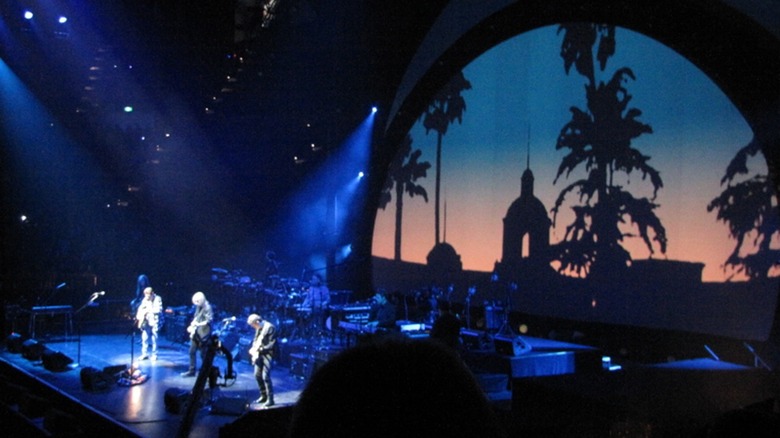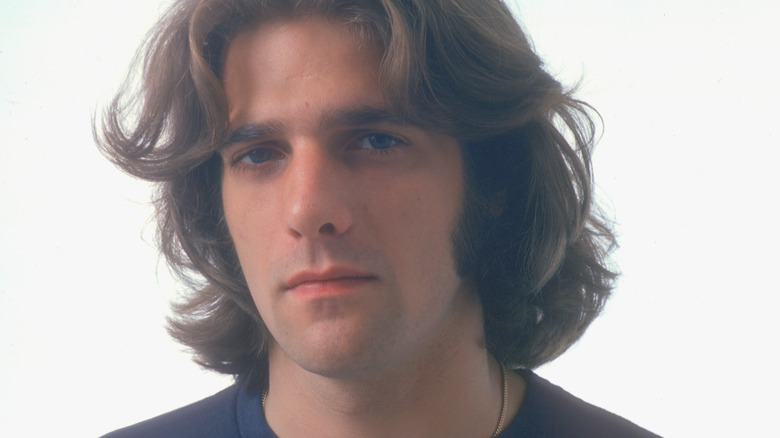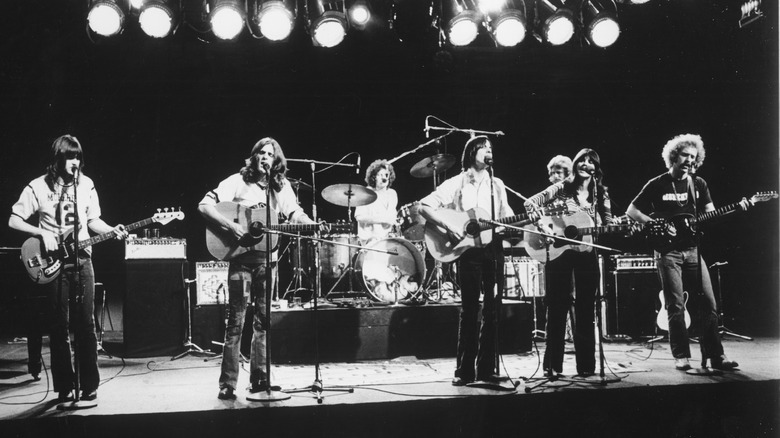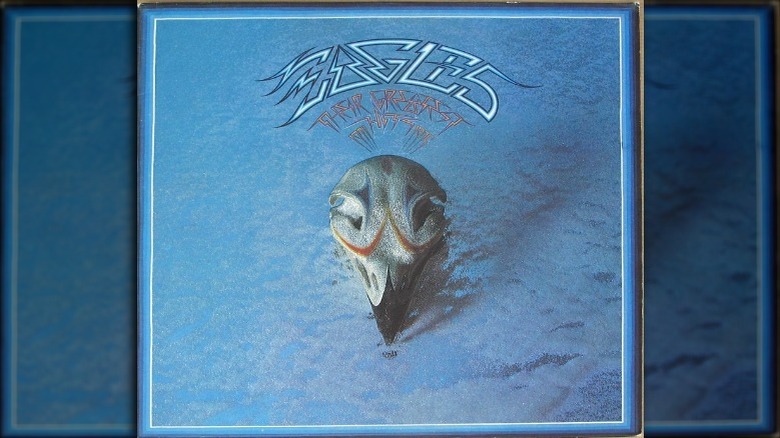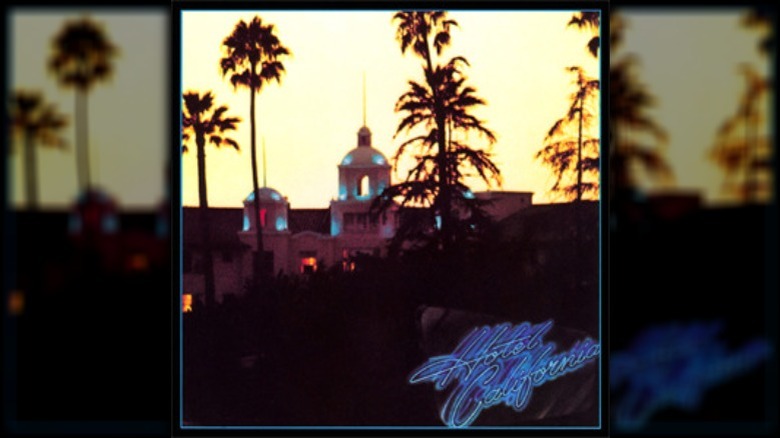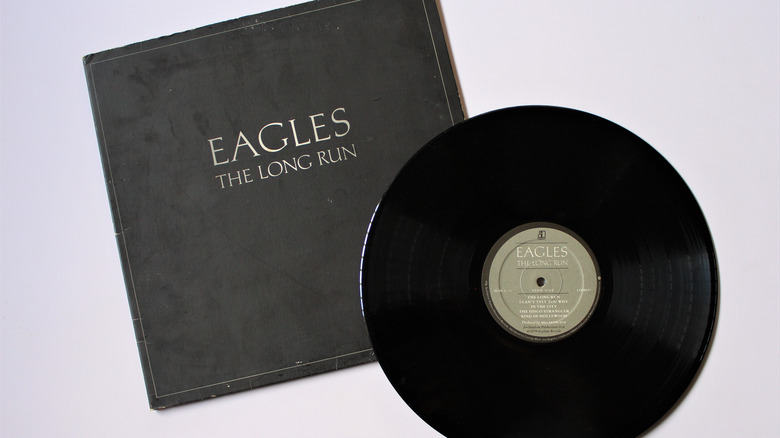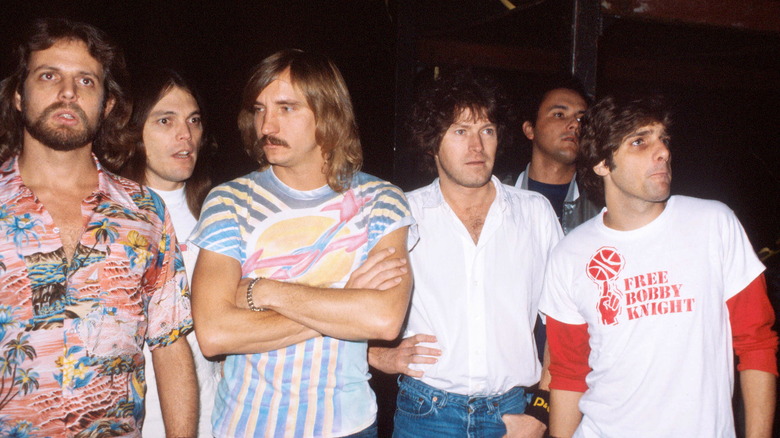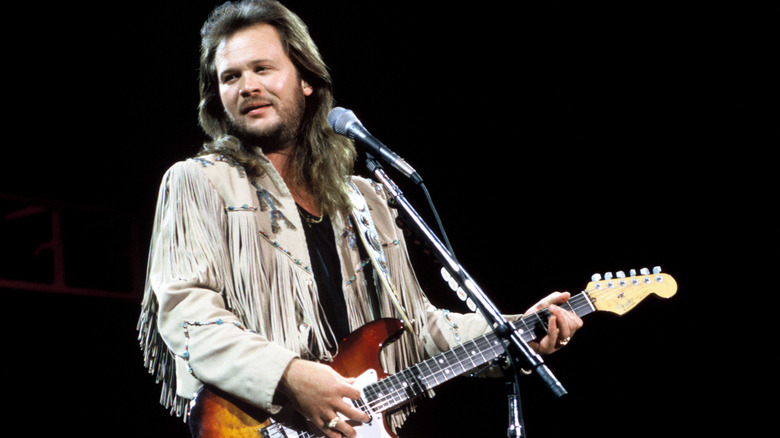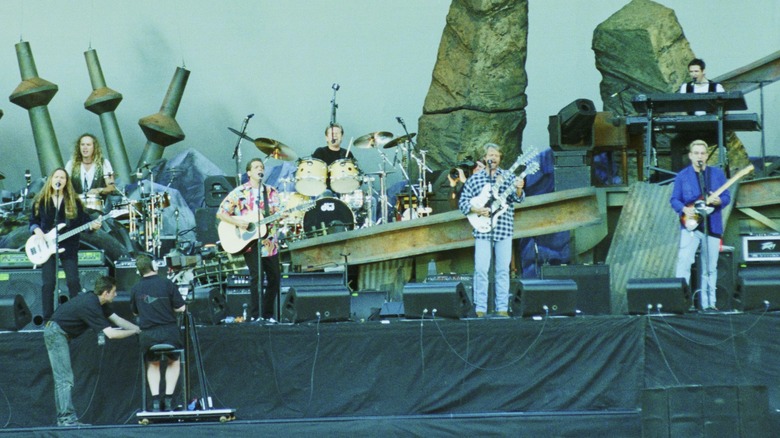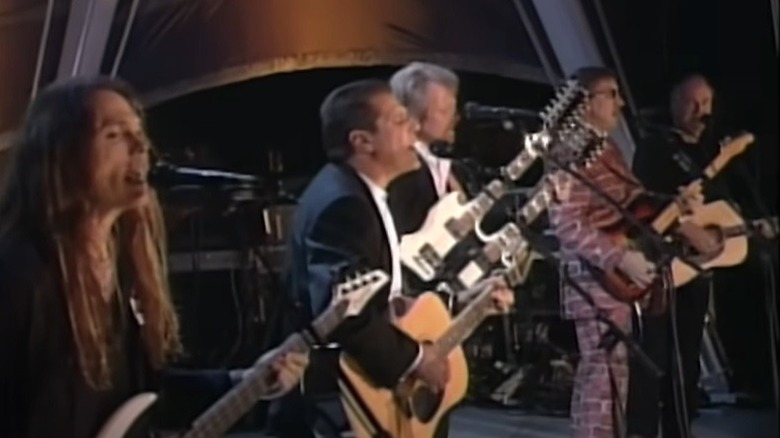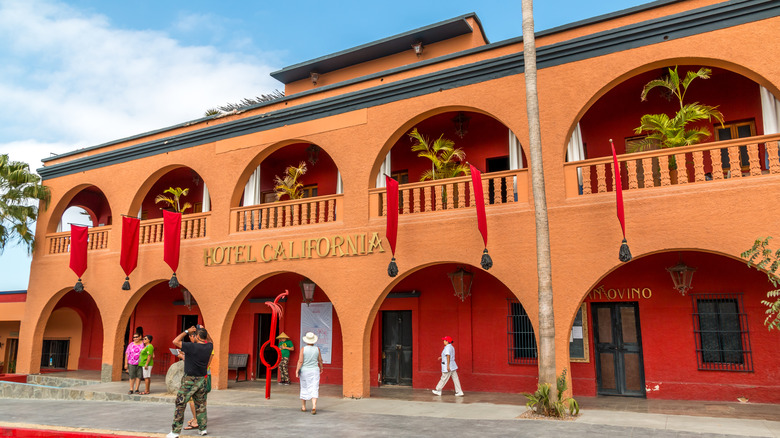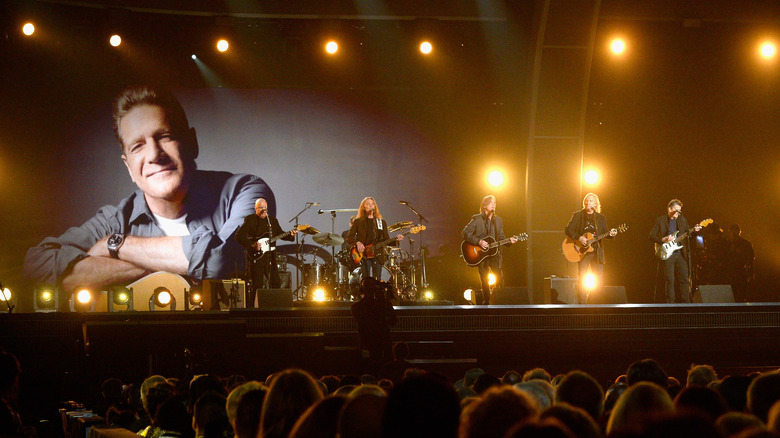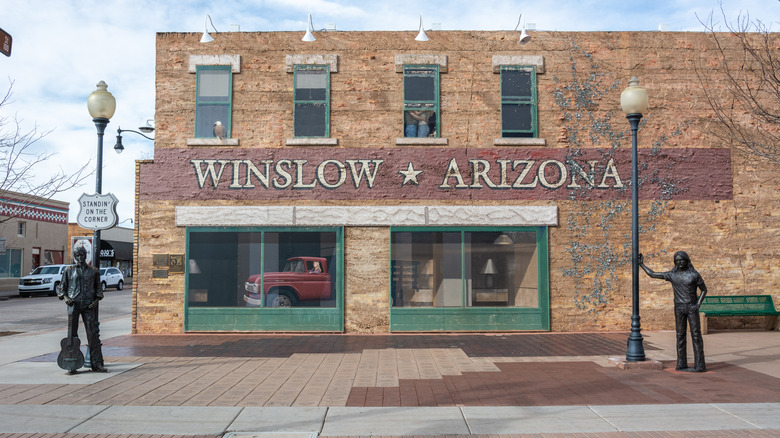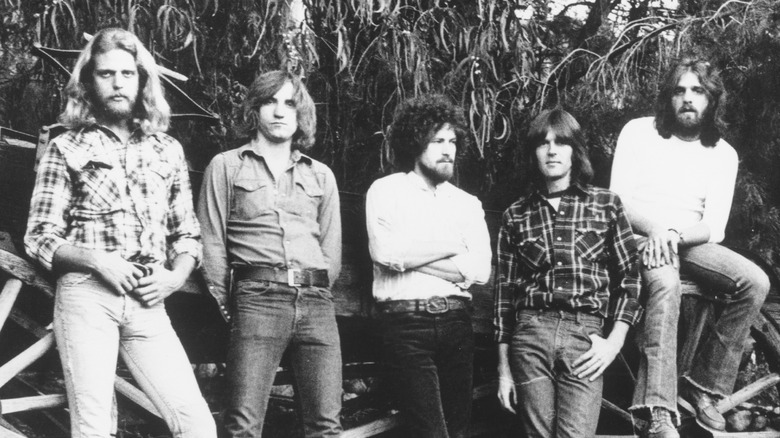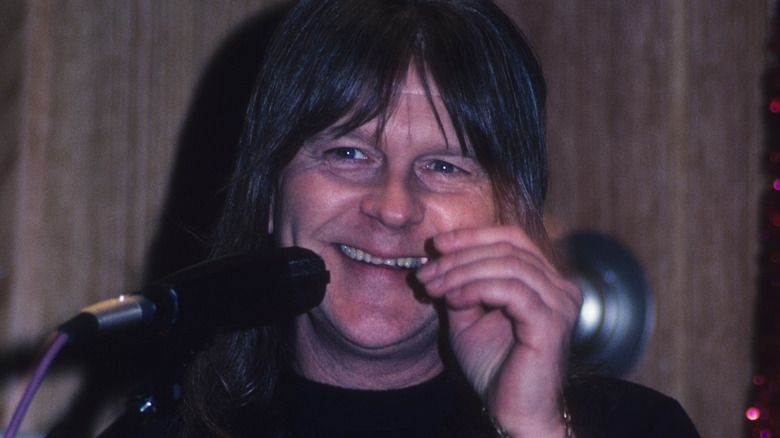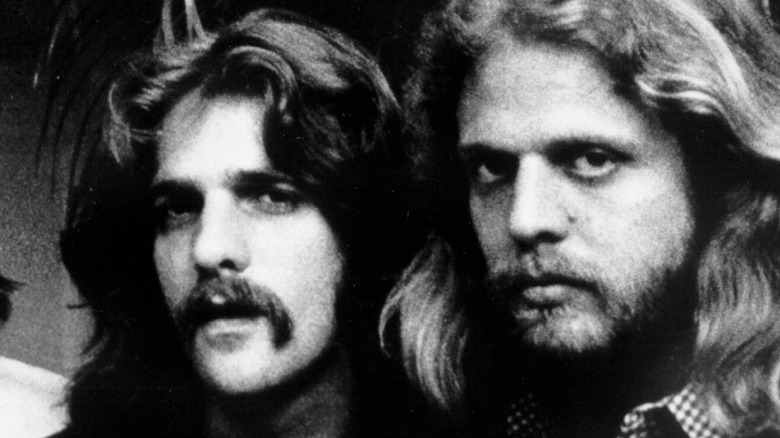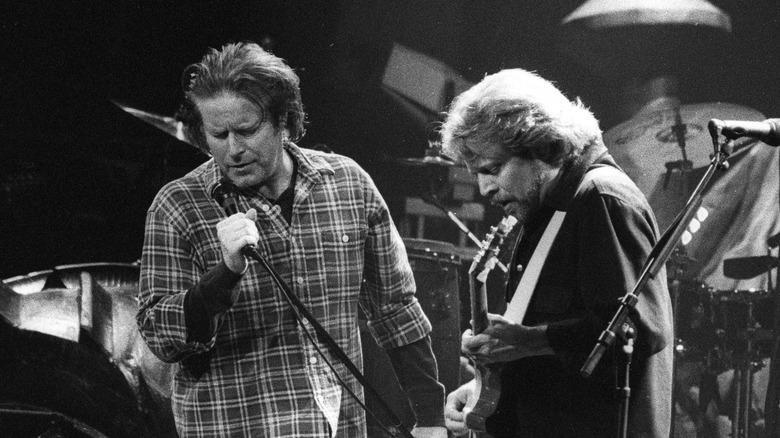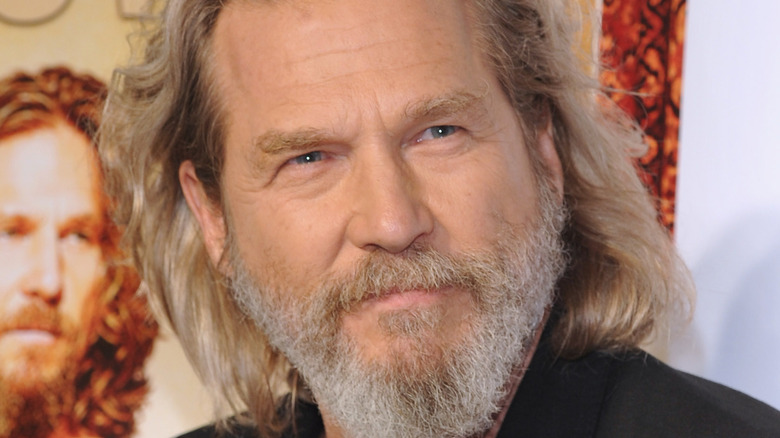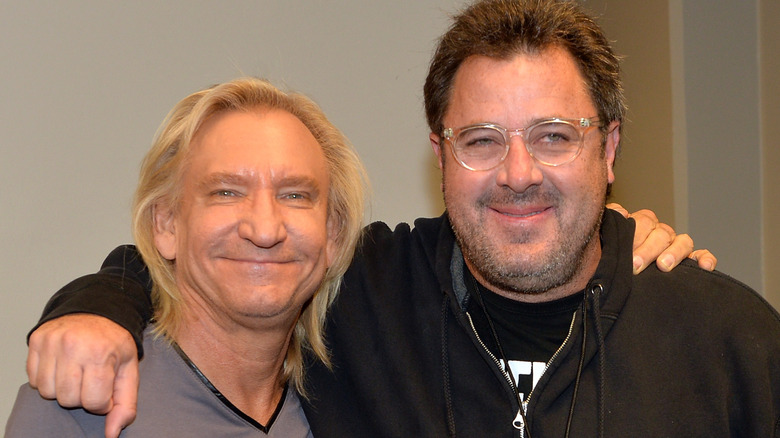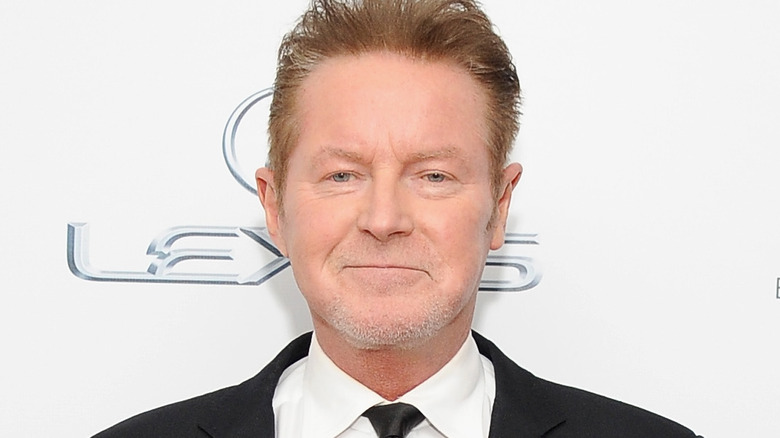The Untold Truth Of The Eagles
With all due respect to the fictional "Big Lebowski" who tells a taxi driver that he "hates the f*****g Eagles," the band in question was one of the most successful bands on the music front of the 1970s, '80s and '90s. With five No. 1 singles, six No. 1 albums and over 200 million record sales since the band first formed in 1971, it's easy to see why this musical group's accomplishments deserve attention. Udiscovermusic calls the Eagles an "American rock phenomenon loved the world over."
Britannica confirms that the original members of the Eagles were Glenn Frey, Don Henley, Bernie Leadon, and Randy Meisner. Together, the musicians "cultivated country rock," a relatively new sound that soon wove itself into the Americana of American music. Fans everywhere were soon grooving to the easy-going sound of the band, whose songs ranged from romantic ballads to rockin' melodies. Add in the solo careers of Frey, Henley, Meisner and later front men Don Felder and Joe Walsh, and it's no wonder Boomsbeat calls the Eagles "one of the world's best-selling bands in history." And as one might guess, the epic band has a story to tell about their rise to fame. Read on for the untold truth about the Eagles.
Eagles founder Glenn Frey got caught smoking pot, a lot
The story goes that back in 1967, Glenn Frey was working with fellow young rocker Bob Seger, who helped him get a contract with Hideout Records. But alas, Frey's mom caught the musicians getting stoned together, and forbade her son from joining a band, any band. After moving to California in 1968, Frey continued working with both Seger and musicians Jackson Browne and J.D. Souther before forming the Eagles with Don Henley in 1971. Joining a band and forming a band were, in Frey's mind, two different things.
Fortunately the Eagles came along when marijuana use was increasing as a recreational drug in America. Even after the band formed, Frey continued working with Browne and the two enjoyed "getting baked together" to get their creative juices flowing. Which perhaps explains why some of the group's songs were so mellow, and others were mysterious and sensual. Not surprisingly, Frey eventually made the news in 1973 when he was busted in Ohio for "drug possession and public intoxication charges." Frey weathered the charge quite nicely, and refused to give up his fondness for smoking pot. He later recalled how producer Glyn Johns (who forbade smoking in the studio) would become "irritated that Randy [Meisner] and I would sneak off and smoke weed."
Singer Linda Ronstadt was responsible for the formation of the Eagles
Glenn Frey and Don Henley were both signed with Amos Records when they met in 1970 at the Troubadour, a club in LA. They would become the founding members of the Eagles. It's been said that the musicians approached Linda Ronstadt about their music, but the artist herself told the Los Angeles Times that Frey was hired to replace Bernie Leadon, who left her backup band for a brief stint with the Flying Burrito Brothers. In the end, Ronstadt, Frey, and Henley talked Leadon into coming back and added Randy Meisner.
Ronstadt hired all four musicians for her new backup band, says Rock Roll Road Map, and the group played together for the first time with Ronstadt at Disneyland. The "chemistry was undisputable," and there was no ill will when the fledgling musicians told Ronstadt they wanted to start their own group; in fact, Ronstadt and her manager, John Boylan, were all for it. The boys even recorded with Ronstadt before releasing their first self-titled debut album in 1972. Classic Rock Review called the effort "impressive, diverse, and sonically superior." The Eagles had landed.
The Eagles were against releasing their first greatest hits album
The Eagles produced three more albums: "Desperado" in 1973, "On the Border" in 1974, and "One of These Nights" in 1975. Each featured enough hits that the band's manager, Irving Azoff of Asylum Records decided to release the "Eagles: Their Greatest Hits (1971–1975)" in February of 1976. Memorable tracks from the album included "Take It Easy," "Already Gone," "Desperado," and a number of other hit songs. The problem was, Azoff did so "without any input from the band." The musicians felt that move was just a slick way to earn extra bucks. And they weren't very happy about it.
Another reason the band objected to the greatest hits album was because they were already busy finishing up their fifth album, "Hotel California." But as it turned out, the greatest hits effort made a huge splash on the music scene. Billboard reports the album hit No. 1 on the chart in March and stayed there for 365 weeks. It was the first-ever certified platinum album. Marc Eliot of the New York Times wrote in 2016 that the album went platinum a whopping 29 times altogether, and remained the "top-selling album of all time" before being nudged to second by Michael Jackson's "Thriller."
Hotel California went platinum 16 times
"Hotel California" absolutely rocked the music world in 1976. According to The Style Inspiration, the album shot up to No. 1 and went platinum within a week of its release. Two songs, "New Kid in Town" and "Hotel California" (with music written by new band member Don Felder), also went No. 1 on the charts. And the album would eventually sell more than 10 million copies. Felder had originally thought of naming the latter tune "Mexican Reggae," but the final decision was the best one by far.
So where was Hotel California exactly, fans wondered. It took awhile to identify the ethereal looking hotel on the cover, which turned out to be the Beverly Hills Hotel. Photographer David Alexander shot the image atop a cherry picker which, at that angle, made the hotel hard to recognize. Die-hard fans soon identified the building, however, and surprisingly the hotel threatened to sue the band. The suit, however, was unfounded seeing as Alexander took the picture from Sunset Boulevard and not on the hotel's property. Meanwhile, music lovers were going absolutely nuts over the cover song, as well as other tunes like "Victim of Love" and "Life in the Fast Lane." And although health issues forced Randy Meisner to leave the band shortly after their album tour, the Eagles earned their first Grammy Award for "Hotel California" in 1977.
Life in the Fast Lane soon denoted a way of life
Glen Frey once recalled being a passenger in a drug dealer's Corvette as the car careened down the highway en route to a poker game. As the car reached 90 m.p.h., a nervous Frey uttered, "Hey, man!" The amused driver just grinned at him, responding, "Life in the fast lane!" The title of a hit song was born, written by Frey, Henley, and newcomer Joe Walsh. It's about a "brutally handsome" man and a "terminally pretty" woman driving like mad around LA while living the wild and crazy lifestyle that was alarmingly common by the 1970's. Eagles Online Central also credits the song as a neologism, a cultural saying that became popular because of the song. But is that really true?
It turns out that yes, it is true. Word Histories, a scholarly site dedicated to the origin of words and phrases, found that the "earliest instances of the phrase" indeed occurred in the Eagles' hit song. Notably, Joe Walsh later explained that the tune "wasn't really a statement about the guys in the band, or about anybody in particular," although it did represent one facet of what he called "the bourgeois jet set." Today, even the Los Angeles Conservancy uses the phrase to explain the evolution of the City of Angels.
There was a reason the Eagles' sixth album was called 'The Long Run'
What does a band do when their music has made them a household word and their wildest dreams have come true? To the Eagles, the success of "Hotel California" and "Their Greatest Hits" had to have been overwhelming. Maybe that's why it took $800,000 and three years of recording to produce "The Long Run." It was also their first album with Timothy B. Schmit, who had replaced Randy Meisner for the "Hotel California" tour. Rolling Stone's Timothy White soundly pronounced the album "a chilling and altogether brilliant evocation of Hollywood's nightly Witching Hour."
White had more to say too, noting that although a first listen of "The Long Run" might lead one to believe it was a "modest, flawed project" the new album was anything but, filled with metaphors and hints to the details of living a musician's life. Yet it seemed almost natural that the album immediately shot up to No. 1 and also was destined to go multi-platinum. The Eagles also scored their fourth Grammy Award for the track "Heartache Tonight." It seemed too good to be true, and it turned out it was. Suddenly, the band members found themselves bickering at each other one day over a single word in a song. Trouble was definitely on the horizon.
The Eagles' break-up really affected Joe Walsh
It was July 31, 1980. The Eagles were giving their usual stellar performance at Long Beach Arena in California, but tensions were high. The show was a fundraiser for Senator Alan Cranston, which Don Felder disapproved of. Still, he shook the thankful Cranston's hand and said, "You're welcome, Senator." But as he turned away, Felder uttered some fateful words: "I guess." Glenn Frey was furious, bringing his anger right onto the stage and exchanging threats with Felder as they sang, ironically, "Best of My Love." The night ended with Felder smashing his guitar on the wall backstage and storming off in a limo. That was the end of the Eagles as far as the band was concerned.
For Joe Walsh especially, the breakup of the Eagles was a stab in the heart. The talented musician had been with the band since 1975, and his penchant for obliterating hotel rooms and chucking furniture out the windows had added a bit of flavor. But when the Eagles disbanded, Walsh said, "I was sad and didn't know what to do. I hit rock-bottom." In the coming years Walsh's solo career would take off, but his personal life became a crazy web of addiction, outlandish behavior, weird sex habits and a downward spiral that wouldn't stop for 14 years.
Country artist Travis Tritt saved the Eagles
When the Eagles broke up, Don Henley vehemently declared that the band would reunite "when hell freezes over." He, along with Glen Frey, Randy Meisner, Don Felder, and Joe Walsh set about establishing their own solo careers but barely talked to each other. And then, along came "Common Thread: The Songs of the Eagles," a tribute album by country artist Travis Tritt and several other Nashville musicians, in 1993. The effort, which received lukewarm reviews, was meant to raise money for Henley's Walden Woods Project. But it ended up doing much more than that.
In 1994, Tritt quietly asked the Eagles musicians to appear in his video for "Take It Easy." The guys agreed, gathering in the studio together for the first time since the breakup. The resulting video was pretty awesome, set in a back-country bar with the band playing alongside Tritt. They were laughing. They were smiling. They were back. Later that year, the Eagles officially reunited, taping an MTV special and going on tour for the first time since 1980. "For the record, we never broke up," Frey quipped at the band's first live performance that April, "we just took a 14-year vacation."
The Eagles were the first band to charge $100 for a concert ticket
In happy defiance of Don Henley's parting words when the Eagles broke up, the band's next album was aptly titled "Hell Freezes Over." It was a live album, recorded when the band went on tour in May of 1994. But how much would their adoring fans be willing to pay to see them again, they wondered. Irving Azoff knew; he rightfully figured the Eagles fans were a little older, a little wiser, and yes, a little richer. Surely they would pay $100 a ticket?
It turned out they would. The Eagles became the first band in concert history to charge $100 for a ticket to their show. That's nearly $200 in today's money, and it shocked the media. The Chicago Tribune's Brenda You and Greg Kot submitted that the Eagles were never "regarded as a particularly strong live act," and only credited Don Henley as having been successful during the band's hiatus. But even they couldn't deny the numbers as fans bought tickets anyway. And in the end, the "Hell Freezes Over" would be remembered as one of the "most successful tours of the 1990s."
Members of the Eagles past and present played together, once
In 1998, the Eagles achieved the best honor of all when singer Jimmy Buffet inducted the band into the Rock and Roll Hall of Fame. Their journey to the top, wrote Parke Puterbaugh, began with a group of "wide-eyed innocents with a country-rock pedigree" and evolved into a great band known for their "grandiose, dark-themed albums" documenting world society as it changed. Randy Meisner later recalled how, after he left the band, his requests to sit in with the group now and then went unanswered. "They have to keep their band the way it is," he said.
That all changed at the Hall of Fame induction, when for the first and only time ever, all seven members of the Eagles, past and present, took the stage for an epic performance. Meisner, along with Glenn Frey, Don Henley, Bernie Leadon, Don Felder, Joe Walsh, and Timothy B. Schmit came together that night to perform "Hotel California." As one might guess, it went off without a hitch as the musicians played as if they had been one band all along. Of the ever "notoriously protective" Irving Azoff who stood in the wings and watched the show unfold, Henley was thankful and quipped, "He may be Satan, but he's our Satan."
Don Felder once sued the band, and the band sued others
At the Rock and Roll Hall of Fame induction, Glenn Frey rightfully pointed out that after 27 years together, "We got along fine. We just disagreed a lot!" That was certainly true as late as 2001, when Don Felder was fired "for asking too many questions." But it was more than that; The Style Inspiration says the issue was "a power struggle of sorts." Felder sued, alleging "wrongful termination" and "breach of contract," and asked for "$50 million in damages." The suit went on for six years and was settled in 2007, with the band being forbidden from discussing the case thereafter.
There were other suits, too. Three years before Felder's firing, the Eagles took umbrage with the American Eagle Foundation, a non-profit that works to "guard and protect the Bald Eagle and all birds of prey." The band claimed the foundation "infringed on its name and image," and that its website and phone number, 1-800-2-EAGLES, hit too close to home. That suit was dropped when Don Henley and Irving Azoff failed to appear because they were in Europe. Then in 2018, another suit against the "Hotel California" resort in Baja, California (pictured) was dropped when it was pointed out that the name had been in place since 1950.
The Eagles almost disbanded after Glen Frey died in 2016
January 18, 2016 was one of the saddest days in music history when the news broke that Glenn Frey had died from a bevy of health problems. The Detroit Free Press lamented that "On stage, he played the charismatic, carefree rock star" even as his health progressively failed. But Frey's passing did not set well with his wife, Cindy, who claimed his doctor failed to care for her husband or even correctly diagnose his health issues. She filed suit against Dr. Steven Itzkowitz and Mount Sinai Hospital in 2018.
The Eagles, meanwhile, were devastated. The Chicago Tribune recounted how Frey had just finished a tour with the band and was spending some family time in Hawaii when he got sick. Back in California, he contracted pneumonia, which contributed to his death. "I don't see how we could go out and play without the guy who started the band," Don Henley said. In February, the band played a tribute to Frey at the Grammy Awards. In attendance, as it happened, was Frey's son Deacon who, a short time later, joined the Eagles in his father's stead. A proud Henley recalled how Deacon was able to "pick up the torch and carry it forward." He tours with the band to this day.
Winslow, Arizona pays homage to the Eagles
Eagle fans who are traveling on Interstate 40 through Arizona owe it to themselves to stop at Winslow, the place where Jackson Browne wrote and Glenn Frey sang of standing on a corner when "a girl, my Lord, in a flatbed Ford" happened by. In 1998, the city built "Standin' on the Corner Park," a spot dedicated to the song with commemorative bricks, murals and two statues, including the 2016 addition of one depicting Frey.
There is also an annual music festival with plenty of festivities, live performances, and other events. And there's a store, also called Standin' on the Corner, which offers Eagles memorabilia as well as lots of kitschy goodies commemorating Winslow. The Washington Post notes that both the park and the shop have brought Winslow a long ways from the days when Highway 40 bypassed the town in 1979. Today, thousands of visitors now stop by, if only to just stand there, on the corner, and reminisce about what the Mercury News calls the biggest, and most underrated, bands of all time.
How Eagles got their name
"The Eagles" is one of the simplest, most elegant, and best-known band names in history, but most people have probably been saying and writing it wrong for the better part of 50 years. Steve Martin wrote in his memoir "Born Standing Up" that he was a regular at the Troubadour, the Los Angeles bar and concert venue where musicians like Don Henley and Glenn Frey also spent a lot of time. One night, the latter told Martin that he had come up with a name for his new band. "He said, 'Eagles.' I said, 'You mean, the Eagles.' He said, 'No, Eagles.'" The group's name technically doesn't employ the use of the definite article, the, and is actually just Eagles.
How the musicians decided on that name is also something of a mystery. According to Far Out, early in the band's history, its members took a trip to California's Mojave Desert and ingested a great deal of tequila and peyote, which inspired a spiritual journey like one the Native Americans who once resided in the area might take. Per Time, Glenn Frey said that the name "Eagles" presented itself, as that animal figures prominently in the beliefs and stories of several indigenous communities. Collaborator J.D. Souther holds that Frey actually saw some eagles fly overhead while under the influence and screamed out, "Eagles!"
The contentious Eagles exit of Randy Meisner
Already a member of prominent country-rock outfits Poco and the Stone Canyon Band, Randy Meisner was an original member of the Eagles. It wasn't until "Take it to the Limit," the third single off the group's fourth album, released in 1975, that Meisner really got a chance to shine, singing lead vocals on the soaring ballad that hit No. 4 on the Billboard pop chart. According to Ultimate Classic Rock, it was the first Eagles hit without Don Henley or Glenn Frey handling the singing, and the only one on which Meisner would.
"Take it to the Limit" was particularly popular at Eagles concerts. "They went crazy when Randy hit those high notes," Henley said in "The History of the Eagles" (via UCR). That bothered Meisner. "They wanted me to stand in the middle of the stage to sing 'Take it to the Limit,' but I liked to be out of the spotlight," he told Rolling Stone. After getting the flu before a gig in Knoxville, Tennessee, Meisner refused to perform in an encore, which he says led to "a spat" with Frey. "That was the end," Meisner explained, although he kept touring with the Eagles for another year or so, not leaving for good until after he got into a fistfight with Frey. "We kind of got mad at each other and we took a swing at each other," Meisner told Rock History Music. "I decided I thought I better leave."
Felder vs. Frey, live on stage
A band that purportedly enjoyed a "Peaceful Easy Feeling" and which implored listeners to "Take it Easy" often didn't take its own chilled-out messaging to heart. Creative and personal tension among band members was so intense that it nearly led to actual physical fighting, in public and during a big Eagles concert no less.
In July 1980, the band played at a fundraiser in Long Beach, California, for the re-election campaign of California senator Alan Cranston. According to Far Out, Cranston gave a long speech before the Eagles played, thanking the musicians for coming out, to which guitarist Don Felder responded, "You're welcome, Senator. I guess." Bandmate Glenn Frey found Felder's words and tone to be more than a little disrespectful, and told him so, right before the Eagles started their concert. "So now we're onstage, and Felder looks back at me and says, 'Only three more songs till I kick your a**, pal.' And I'm saying, 'Great. I can't wait,'" Frey recalled.
At the end of the set, Felder took out his physical aggression on a guitar, smashing it against a wall and seething at the other Eagles before he left in a limousine. That's the last time the band would play together for more than a decade.
Eagles helped out other Eagles in the '80s
While the Eagles would officially reunite in 1994 with the blockbuster "Hell Freezes Over" TV special, album, and tour, the regrouping wasn't completely out of the blue. The band was always something of a supergroup, formed by the prolific members of the burgeoning California country-rock scene of the early 1970s. The once and future Eagles kept working with or near one another in various capacities throughout the 1980s, before "Hell Freezes Over."
Per the LA Times, in 1982, Eagles manager Irving Azoff produced the high school comedy "Fast Times at Ridgemont High" as well as its soundtrack, which boasts so many Eagles solo songs that it might as well be an Eagles record: Joe Walsh's "Waffle Stomp," Don Henley's "Love Rules," Timothy B. Schmit's "So Much in Love," and Don Felder's "Never Surrender."
Azoff also put together the soundtrack for the animated sci-fi cult classic "Heavy Metal," and Felder's title track features backing vocals from Henley and Schmit.
One of the Eagles didn't like 'The Dude' either
The music of the Eagles looms large in one of the most enduring cult hit movies of all time — but not in a good way. The Coen Brothers' 1998 crime comedy "The Big Lebowski" centers around a zoned-out, perpetually stoned aging hippie-type named Jeffrey Lebowski (Jeff Bridges) who likes his area rug, fuzzy sweaters, and White Russians, but decidedly not the Eagles. In one scene, his well-stated distaste for the band gets him thrown out of a cab. The driver angrily refuses to turn off a radio playing "Peaceful Easy Feeling," and Lebowski explains that he "had a rough night and I hate the f****** Eagles, man."
While they allowed "Peaceful Easy Feeling" to appear on the soundtrack of "The Big Lebowski" and thus be the butt of the joke, the Eagles had mixed feelings about their contribution to movie history. "I remember I ran into Glenn Frey, he gave me some s***," Bridges told Rolling Stone. "I can't remember what he said exactly, but you know, my anus tightened a bit." Eagle Don Henley, however, Bridges told Radio.com (via The Telegraph), didn't mind the cinematic ribbing.
How a country superstar became an Eagle
The Eagles are far and away the biggest country-rock act of all time, responsible for two of the top three best-selling albums of all time, according to the RIAA. Many other musicians rode that signature Eagles sound to their own success, such as the Pure Prairie League, best known for its 1980 top 10 hit "Let Me Love You Tonight." Replacement singer Vince Gill sang lead on that tune, before leaving to enjoy a monumental career as a strictly country music performer, before rejoining the country-rock scene decades later in 2017 as a member of the Eagles. After steadfast Eagle Glenn Frey died in 2016, the band carried on without him, replacing the singer and guitarist with his son, Deacon Frey, and Gill. The deceased "was an old friend, and I actually knew all those guys fairly well over the years," Gill told the Cleveland Plain-Dealer. "Somebody asked Don Henley at one point, 'Why'd you get the country guy in the band?' and he said, 'Well, he knows how to be in a band.'"
The actual business of hiring Gill was orchestrated by the Eagles manager, Irving Azoff. "He picked my manager Larry Fitzgerald's brain about my interest," Gill told Rolling Stone. "From what I've been told by Don, I was the only consideration."
Who's the richest Eagle?
The Eagles made a lot of people a lot of money. The half-dozen or so foundational members of the group sold millions of records both during their 1970s heyday as an active act and consistently since they went their separate ways in 1980. Two of their albums, "Hotel California" and "Their Greatest Hits 1971–1975" are among the bestselling LPs ever, with Recording Industry Association of America certifications of 26 million and 38 million, respectively. Their 1994 comeback record "Hell Freezes Over" sold 9 million, a second hits collection moved 11 million units, and all of that is money in the bank for the guys who played on those songs, and more for the people who wrote them, like Eagles singer and drummer Don Henley. Post-Eagles, he launched a notable solo career, hitting the top 40 of the Billboard pop chart eight times with hits like "All She Wants to Do Is Dance," "The End of the Innocence," and "The Boys of Summer."
According to Celebrity Net Worth, Henley's net worth is in the neighborhood of $250 million. That makes him far and away the Eagle who soared the highest financially, outranking the late Glenn Frey ($120 million) Joe Walsh ($75 million), Vince Gill ($30 million), Timothy B. Schmit ($25 million), Randy Meisner ($15 million), and Bernie Leadon ($10 million).
